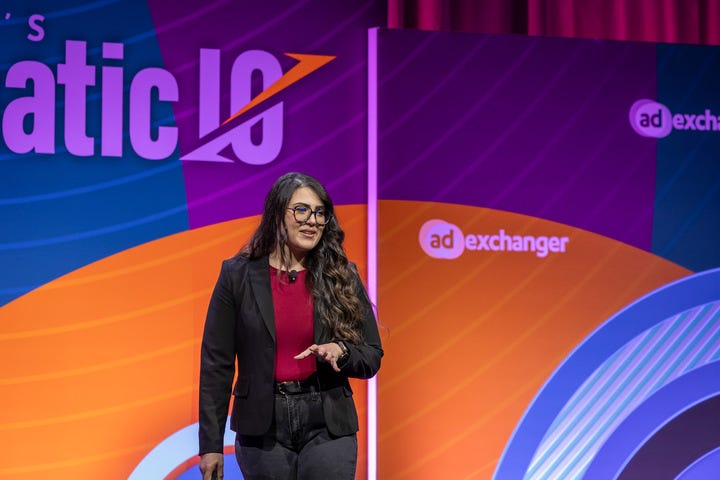Welcome to a special podcast report from Future Media.
I’m diving into a disturbing exposé that ads from the US Government and the world’s most famous brands were served on websites containing abhorrent child sexual abuse.
The US Department of Homeland Security, the Wall Street Journal, and even Save The Children, unwittingly funded abuse through ads placed by partners including Google, Amazon, Microsoft, Outbrain, and more.
And the brand safety companies which press-gang publishers and brands to pay them significant fees to ensure that this can’t happen, didn’t catch it.
This sickening debacle has exposed the frailties, systemic failures, and conflicting commercial imperatives that have grown to be a cancer in programmatic advertising.
And this broken system rewards bad actors and those willing to profit from sickening crimes - while punishing those who invest in creating and curating premium content.
How did we get here? Well, I’m going to find out, and I’m pulling no punches.
That means calling BS on the virtue-signalling that’s rife through the ad industry, and naming those who promise the world but fail when push comes to shove.
And, in a break with the norm, I am posting this outside the paywall as it’s a story that should get the widest possible distribution.
Welcome then to newsletter #272, and hi to new subs from the Financial Times, the kind folks over at USA Today who sent me a nice note over the weekend, the London office of Reuters, and then from BBC Studios just down the road, rising indy publisher CapitalBrief and the newsroom at the Sunday Telegraph in Australia, AI-enhanced podcasters Klaxon.ai in the UK, the ad tech team at Grupa Wirtualna Polska in Pomorskie, Poland, Dutch ad platform Azerion, the programmatic team at Ribeye Media in New York, Palo Alto ad fraud watchdog Pixalate, and eOne (now part of Lionsgate) the producers of The Walking Dead, among others… 🧟♂️ 🍴 🧠
And thanks to this week’s sponsor Avid Collective.
How and why the ad industry has contorted itself into a $700 billion criminal enterprise that’s hidden in plain sight is the big question today.
When I raised it on a panel at an ad tech event last year, the moderator shut me down with a swift Let’s move on...
The single most important question facing the ad industry - and one that has the effect of crippling premium publishing hundreds of millions of times a day - was swiped away and left hanging in the air.
People in the audience were in the process of putting their hands in the air to comment when I was silenced. They came to speak to me afterwards.
“These failures are talked about in every corner of our office every day,” one told me. “It’s not even a whisper any longer,” another said. “Everyone knows.”
The system is broken, and the price for efficiency is now being measured in children being abused for profit.
That means self-regulation has drowned in a wave of self-interest.
That price is too high, so it’s time for change.
This debate too often becomes mired in complexity, so to help me decipher it, I’m joined by Arielle Garcia, the COO of the Check My Ads Insitute.
She was previously global head of privacy at top ad agency Universal McCann, before quitting and whistleblowing toxic practices in a blockbuster AdExchanger op-ed.
She’s now aiding the US Senate inquiry into the latest scandal.
It’s considered so seriously at the top of US politics, that it’s bridged the political divide.
And there are now calls to bring the self-policed ad tech industry to account once and for all.
Together, we hammer out some solutions that can repair the damage and set the industry straight.
Just before we begin, there’s been a late update: Several of the ad tech firms named in this damning report have provided statements. See them at the end.
Ad research body Adalytics was running an investigation to see whether Fortune 500 company and taxpayer-funded ads from the US Government were being served to bots.
The goal was to reveal ad fraud and expose failures in the tracking and policing of ad delivery. What it uncovered was much more sinister.
The Adalytics report revealed that industry-certified ad tech companies transacted ads on a website known to host child sexual abuse - known in industry as CSAM.
*Note: The report contains disturbing images and depictions of abuse.
Adalytics notified the FBI, Department of Homeland Security, the National Center for Missing and Exploited Children, and the Canadian Centre for Child Protection.
It named two ad-funded image-sharing sites where the ads were served, which had previously been censured multiple times for facilitating child sex abuse content.
The sites have more than 40 million page views per month - more than the Financial Times, The LA Times, Politico, or the website of the Library of Congress.
Adalytics says ads were delivered to the site by vendors including Amazon, Google, Criteo, Quantcast, Microsoft, Outbrain, TripleLift, Zeta Global, Nexxen, and more.
Advertisers who unknowingly had their ads placed there included the US Department of Homeland Security, MasterCard, Starbucks, PepsiCo, Honda, Uber Eats, Sony Electronics, Unilever, Adobe, L’Oreal, Nestle, Adidas, Domino’s, Samsung, Paramount+, HBO Max, Dyson, the Wall Street Journal, and savethechildren.org.
All absolutely awful, but perhaps most disturbing of all, was the failure of several market-leading brand safety verification vendors who failed to stop it happening.
Ad tracking tags from leading vendors DoubleVerify and IAS were found measuring and monitoring the ads on these abuse pages.
Adalytics reported:
Video ads showing the National Football League were served on a site showing a photo from an online sex game. The ads appeared to use DoubleVerify tags.
It’s unclear the degree those policies are enforced if US government ads can be seen on a website that’s been known to host CSAM for more than three years.
Checks showed the websites were hosting porn, and an ad delivered by Google DV360 for the US Department of Homeland Security.
When child sexual abuse was discovered, the evidence was handed to the FBI and US law enforcement, as well as the National Center for Missing and Exploited Children.
NCMEC was established by the US Congress in 1984 to prevent child victimisation. It publishes annual reports naming platforms where exploitative material is found.
Checks on its records found that the abuse sites serving these ads had been flagged by its register 27 times in the past three years.
Adalytics said it used a bot to crawl historic webpages to look for ads and to track who served them.
On September 19, 2023, (the) bot crawled the site and whilst screenshotting, it was served a digital ad by Google DV360. The ad was for the US Department of Homeland Security.
This means the US government may have inadvertently helped finance a website known to host and distribute child sexual abuse material via its ad spend in Google DV360.”
Arielle and the Check My Ads Institute has since filed a complaint with the Trustworthy Accountability Group.
TAG is an ad industry initiative designed to combat fraudulent digital advertising, improve transparency, and enhance brand safety.
It was founded by major advertising trade groups, including the Association of National Advertisers, the American Association of Advertising Agencies, and the Interactive Advertising Bureau.
It is funded by its members, which include the same organisations identified in the investigation, including Google, Amazon and Outbrain, among others.
The complaint seeks transparency on how TAG sets its standards as well as its enforcement practices.
“Certification without enforcement is a scourge on the industry that undermines trust and cuts against TAG’s very mission,” Arielle says in the complaint.
The complaint echoes concerns raised by prominent US Senators Marsha Blackburn (Rep) and Richard Blumenthal (Dem).
The pair, who have worked together on increasing safety for young people on the web, have written to the CEOs of Google, Amazon, DoubleVerify, IAS, the Media Rating Council and TAG demanding accountability.
The Check My Ads Institute has urged TAG to take decisive action, suspending the certification of non-compliant vendors for six months while conducting a public and independent audit.
“We believe that conversations that impact the digital ad industry and public at large should happen in broad daylight and be open to all,” Arielle said.
“Where industry-certified vendors for years have transacted ads on CSAM, treasury sanctioned websites, piracy, and animal abuse, we are all interested parties.”
Update:
In the past few hours, some of the ad tech firms identified in this report have responded to the allegations.
Amazon said: “We are taking additional steps to help ensure this does not happen in the future.”
Microsoft has stopped serving ads on the website.
Criteo said: “We are reviewing our process to minimise the chance of this happening again.” Note that’s not stopping it, just a promise to try to reduce the risk.
The IAB Tech Lab issued guidance on how the industry can “step up” with better transparency and best practices.
Integral Ad Science “immediately labelled the domains listed in the report as ineligible for monetisation” and “initiated a review”.
It “will take the learnings from this review into account as we re-assess our classifications for image-hosting sites on the open web and our practices for blocking and reporting sites that disseminate illegal content,” it said.
DoubleVerify announced it was conducting “an additional comprehensive review” and deploying “stricter classification standards”. Again, not a fix, just a re-assurance.
Arielle and team are continuing to work with the Senators and their staff on a precise, and meaningful oversight process.
Last June, Arielle penned an op ed for Future Media flagging the toxic interdependency between Big Tech and agency groups.
“A near-sighted pursuit of profit will jeopardise critical public safety initiatives,” she warned then.
Google’s breaking down, but we need to keep our eye on the ball
Arielle Garcia was UM Worldwide’s global privacy chief before quitting to expose unethical practices, including the toxic interdependency between Big Tech and agency groups.















